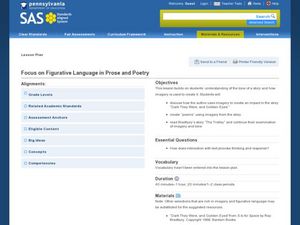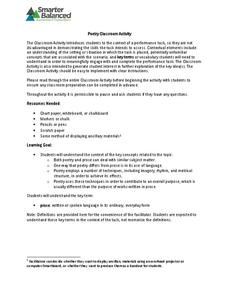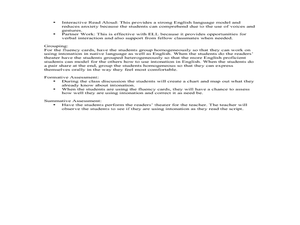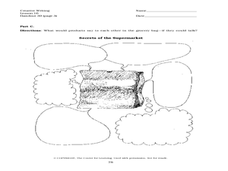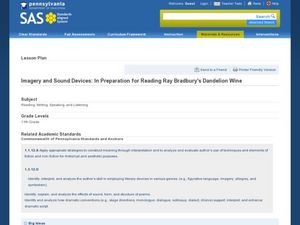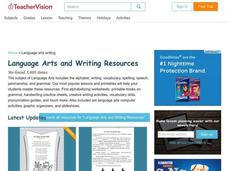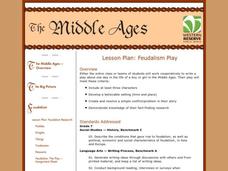Curated OER
Prose Styles: Tough, Sweet, and Stuffy
Take a walk on the rhetorical side with this presentation, which discusses three styles of prose: tough (ethos), sweet (pathos), and stuffy (logos). The slide show provides thorough definitions and examples of each style, as well as...
Texas Education Agency (TEA)
Close Reading of Prose: Practice 2 (English II Reading)
The tone is easy to hear but more challenging to detect in written texts. Users of this interactive learn how to closely observe the diction and words writers use to convey their feelings about their subject. They examine passages that...
ReadWriteThink
What is Poetry? Contrasting Poetry and Prose
Introduce middle schoolers to the different strategies used when reading prose versus poetry. Groups use a Venn diagram and a poetry analysis handout to compare the characteristics of an informational text and a poem on the same...
Curated OER
Focus on Figurative Language in Prose and Poetry
Students place emphasis on the use of figurative language when analyzing prose and poetry. In this figurative language lesson, students explore the tone of a story and its imagery. Students read and discuss how the author uses imagery in...
Bantam Books
The Tempest: Kinesthetic Grammar Approach
Though beautiful, William Shakespeare's prose can be inhibiting for learners who are new to his works. A lesson based on The Tempest guides high schoolers through the paraphrasing process, including noting the subjects and verbs to...
Curated OER
Focus On Figurative Language in Prose
Students examine the use of literary prose in the story, "Dark They Were, and Golden-Eyed." In this literary prose activity, students investigate the use of imagery, metaphor, and simile in the story. They tell how author's purpose is...
New York City Department of Education
Egypt
This six-week unit encompasses all subjects with a focus study on world history and the development of ancient civilizations. As gifted and talented students dive into the interesting yet challenging topic of Egypt, they...
Curated OER
Writing Prompts: Prose, Pamphlets and Poems
Students practice reading an atlas and writing prompts. They use graphic organizers to construct their writing prompt. They use the Internet to do their research.
K20 LEARN
Sentence Structure in Siddhartha: Simple, Compound, Complex, and Compound-Complex Sentences
While wisdom may not be communicated, knowledge of sentence structures certainly can. Teach young grammarians the power of syntax with a lesson that uses Herman Hesse's Siddhartha as a mentor text. Learners first rewrite captions for an...
Smarter Balanced
Poetry
How does poetry differ from other forms of writing? Class members view two writing samples, decide which one is a poem, and then identify the criteria they used to distinguish between the two samples.
Curated OER
Reading (Fluency)
Emerging readers practice reading fluency. First, they listen to the teacher and classmates model fluent reading, and then they practice fluent oral reading with a partner. To close the day, they participate in a Reader's Theatre based...
Curated OER
Prize-Winning Prose
Students develop criteria for 'Kids' Pulitzers,' awards in categories of writing determined by Students. Each student then bestow a 'Kids' Pulitzer' upon a piece of writing which they deem to be distinguished based on the established...
Curated OER
Lesson: Ginger Brooks Takahashi: Powerstich: A Forum for Community-Building
This is a great way to build community in your school, experience process-based art, and explore the critical-thinking process. While quilting as a class collectively (just like a quilting bee) pupils listen to poetry and prose of a...
University of North Carolina
Philosophy
Philosophers ask some of life's biggest questions about the nature of mankind, existence, and time, so what's it like to study the subject? A handout outlines different types of philosophy assignments common in college-level courses. The...
Curated OER
The Verbal Sketch
Young scholars use perspective observation sketches to understand verbal description. In this subjective writing lesson, students practice writing subjective conversations using the cartoon worksheets.
Curated OER
Poetry Appreciation – "The Raven"
Introduce your class to "The Raven" by Edgar Allan Poe with this series of activities, exercises, and worksheets. Class members examine an image, analyze a movie trailer, read a prose version of the poem, look up vocabulary, and pick out...
Curated OER
Imagery and Sound Devices: In Preparation for Reading Ray Bradbury's Dandelion Wine
Twelfth graders analyze Ray Bradbury's use of techniques and elements of fiction as well as nonfiction in the novel Dandelion Wine. In this novel analysis lesson, 12th graders analyze the sensory techniques in Dandelion Wine. Students...
Curated OER
Arthur Young and the President
High schoolers work with NASS data by converting it into prose. For this historical agriculture information lesson, students read about how George Washington communicated information about crop yields, livestock, and land values. They...
Curated OER
I Know Why the Caged Bird Sings
Students read and analyze the novel "I Know Why the Caged Bird Sings" by Maya Angelou. They discuss the poetry and prose of the book, the importance of role models, complete a worksheet, and write a narrative using figurative language.
Deer Valley Unified School District
Close Reading: Analyzing Mood and Tone
The AP Literature and Composition exam is all about close reading. Test takers are presented with a passage and asked to analyze how an author uses literary devices to create a desired effect. Prepare your students for the exam with a...
Northeastern Educational Television of Ohio, Inc.
Feudalism Play
Using research notes on feudal roles in medieval Europe, learners work cooperatively to write a play about one day in the life of a boy or girl in the Middle Ages.
Curated OER
Figurative Language Project
Want a handy way to remember the difference between metaphors and similes, or allusions and alliteration? Individuals craft their own figurative language booklet, complete with definitions, examples, and illustrations, following...
Curated OER
Reading/English Language Arts/ Instructional Strategies
Students are given a line drawing that only that students sees. They are asked to describe the drawings to the reset of the class to see if they can draw it as the teacher describes it. Students work with a partner, and they are given a...
Curated OER
Interative History Notebook Mini-lesson
High schoolers respond to Holocaust literature. In this interactive history lesson, students select quotes from chapter 1 of Elie Wiesel's Night and reflect on their meaning as they record their thoughts on poetic, prose, comic. or...





